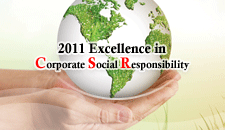|
PLANET CEO interviewed on the Top Prize of "2011 Excellence in Corporate Social Responsibility Award" by CommonWealth Magazine |
 PLANET Technology is honored to receive the Top Prize of ō2011 Excellence in Corporate Social Responsibility Awardö from Common Wealth Magazine among over 2,000 publicly listed SME in Taiwan. Our CEO, Mr. Jack Chen has been interviewed to elaborate how PLANET reaches this great achievement. PLANET Technology is honored to receive the Top Prize of ō2011 Excellence in Corporate Social Responsibility Awardö from Common Wealth Magazine among over 2,000 publicly listed SME in Taiwan. Our CEO, Mr. Jack Chen has been interviewed to elaborate how PLANET reaches this great achievement.

This year, Planet Technology Corp., the top player among the nation's core medium-sized enterprises, has handled its corporate social responsibility (CSR) policies even better than many of Taiwan's major conglomerates.
Over the past six years, Planet has at critical moments taken around 3,000 lackluster students under it wing, providing professional assistance so that kids who have fallen behind in their studies or lack family support won't give up on themselves or even start out on an unhealthy path from which there may be no turning back.
Planet has recently extended its public service efforts into the watershed of the Feitsui Reservoir, assisting tea farmers in switching to organic farming practices to help reduce pollution from agricultural runoff in the Greater Taipei water supply.
"We mostly play the role of resource integrator," Planet chairman and CEO Jack Chen muses.
Chen and his wife, Planet vice president Christine Hsu, have taken their experience in creating an independent brand and surviving in the international market, and translated it into public service action: finding the right partners and integrating resources while also helping establish management systems and following up on a regular basis.
For its remedial education program in elementary schools serving the areas of Sindian, Muzha and Sansia, Planet first found appropriate cooperative partners ¢ a group of committed school principals, administrators and teachers ¢ and began to experiment at a single school, similar to the manner in which a newly developed product design is tested and gradually tweaked before being replicated in mass production.
Planet now has a set of standard operating procedures in place for its Disadvantaged Children's Remedial Education Program, from incorporating the leadership of principals and administrators, to training selected teachers and volunteers and assigning professional psychological counselors to tutor students in need.
And the program doesn't stop with tutoring, as it borrows from Planet's customer satisfaction survey methods in evaluating performance.
The program also includes written documentation of each counseling and tutoring session, and annual summer training camps where participating teachers discuss case studies and avenues for improvement. There is also regularly scheduled tracking of students' academic performance and the effectiveness of psychological counseling. In this way the corporate management cycle of "plan-do-check-act" is achieved.
More than a few of the teachers that take part in this program find themselves moved to tears. Due to their position on the front lines of education, they are aware that the learning difficulties of many kids are anything but innate, only arising because no one has made the extra effort to give them a leg up.
Relying solely on the singular efforts of individual teachers has its limits, but through Planet's pooling of resources a lot of students have been brought back from the brink of troubled childhoods.
The majority of the funding Planet directly invests in the program derives from the 10 percent of the funds raised in its 2004 initial public offering, which it used to establish Taiwan's first educational trust fund.
First Bank's Pinglin branch has also been inspired, and has joined in promoting this institution to assist local disadvantaged kids with remedial education. Other First Bank branches may follow suit in the future. This would provide assistance to even more disadvantaged students.
"If Planet were to stick to traditional methods and get its employees to tutor kids at schools, the effort wouldn't be very professional," Chen says with a laugh, "and a lot of the kids might run for the hills when they saw so many strange faces ¢ forget about making any progress."
Planet has received rave reviews for institutionalizing its public service program, receiving a score of 8.5 in the category of "community involvement" in the 2011 CommonWealth Magazine Corporate Citizen Survey ¢ the highest among medium-sized companies.
Donating money or doing charity work is definitely not the same as a business attending to its social responsibilities, Hsu emphasizes. Instead, it involves using the company's own core capabilities and limited resources to assist those most in need.
Planet has not only shown outstanding performance in community involvement, but its treatment of employees is also an example of SME flexibility.
One product manager that makes his home in Hualian applied for an alternative job site for family reasons. The employee is now allowed to work from Hualian, reporting to company HQ for three days every two weeks. This approach not only allows the company to retain talent but also addresses the needs of employees.
Properly handling corporate social responsibility also benefits a company's recruiting efforts as it naturally attracts like-minded job seekers, Chen says.
|
|